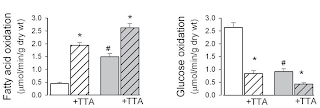TTA + Fish Oil - Fat Burning Superfats or Hepatoxic Pro-Oxidants? Why You Better Avoid Large Amounts of Omega-3 and Tetradecylthioacetic Acid in the Long Run

Image 1: Even if you align them like that, it is at least debatable whether capped fish oil is much more natural than the structurally modified 16 -carbon saturated fatty acid tetradecylthioacetic acid (TTA). As far as their effects on weight loss are concerned, the latter is certainly more potent,... the debate on the side-effects of both is yet still far from being settled. Despite the mainstream hoopla around the former... At least for those of you who have been around the supplement world for some time, the acronym TTA, which stands for tetradecylthioacetic acid , a structurally modified 16 -carbon saturated fatty acid (SFA), which has been shown to increase fatty acid oxidation and reduce triglyceride levels via interactions with purportedly all PPAR-receptors, should ring a bell. For the rest, it will yet probably be news that, back in the early 2000s, TTA was all the rave as the new star among OTC-fat burners. And in fact, the weight loss people experienced on respective pr...
